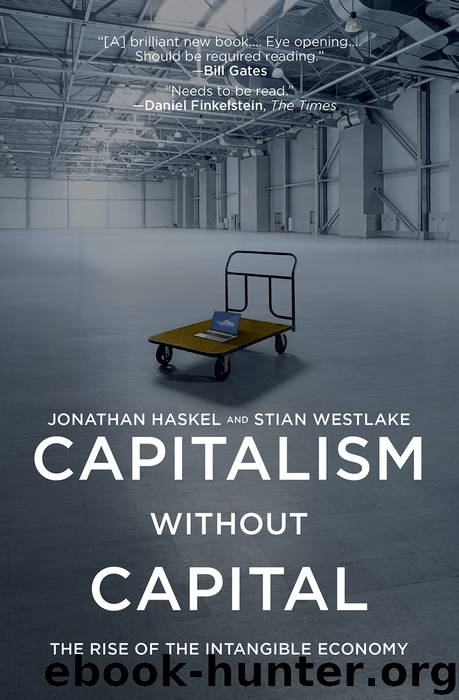Capitalism Without Capital by Haskel Jonathan; Westlake Stian;

Author:Haskel, Jonathan; Westlake, Stian; [Haskel, Jonathan; Westlake, Stian;]
Language: eng
Format: epub
ISBN: 9780691183299
Publisher: Princeton University Press
Published: 2017-01-15T07:00:00+00:00
Conclusion: The Implications of an Intangible Economy for Inequality
We’ve argued that the rise of intangibles explains several aspects of the long-run rise in inequality.
First, inequality of income. The synergies and spillovers that intangibles create increase inequality between competing companies, and this inequality leads to increasing differences in employee pay (recent research suggests these interfirm differences account for a large proportion of the rise of income inequality). In addition, managing intangibles requires particular skills and education, and people with these skills (such as Reich’s symbolic analysts) are clustering in high-paid jobs in intangible-intensive firms. Finally, the growing economic importance of the kind of people who manage intangibles helps foster myths that can be used to justify excessive pay, especially for top managers
Second, inequality of wealth. Thriving cities are places where spillovers and synergies abound. The rise of intangibles makes cities increasingly attractive places to be, driving up the prices of prime property. This type of inflation has been shown to be one of the major causes of the increase in the wealth of the richest. In addition, intangibles are often mobile; they can be shifted across firms and borders. This makes capital more mobile, which makes it harder to tax. Since capital is disproportionately owned by the rich, this makes redistributive taxation to reduce wealth inequality harder.
Finally, inequality of esteem. There is some evidence that supporters of populist movements (Brexit in the UK, Trump in the United States) are more likely to hold traditionalist views and to score low on tests for the psychological trait of openness to experience. Openness to experience seems to be important for the kind of symbolic-analysis jobs that proliferate as intangibles become more common. So the increasing importance of intangibles leads to economic pressures that underscore the political divides driving today’s populist movements.
Download
This site does not store any files on its server. We only index and link to content provided by other sites. Please contact the content providers to delete copyright contents if any and email us, we'll remove relevant links or contents immediately.
International Integration of the Brazilian Economy by Elias C. Grivoyannis(111061)
The Radium Girls by Kate Moore(12029)
Turbulence by E. J. Noyes(8052)
Nudge - Improving Decisions about Health, Wealth, and Happiness by Thaler Sunstein(7709)
The Black Swan by Nassim Nicholas Taleb(7130)
Rich Dad Poor Dad by Robert T. Kiyosaki(6637)
Pioneering Portfolio Management by David F. Swensen(6301)
Man-made Catastrophes and Risk Information Concealment by Dmitry Chernov & Didier Sornette(6019)
Zero to One by Peter Thiel(5802)
Secrecy World by Jake Bernstein(4753)
Millionaire: The Philanderer, Gambler, and Duelist Who Invented Modern Finance by Janet Gleeson(4479)
The Age of Surveillance Capitalism by Shoshana Zuboff(4293)
Skin in the Game by Nassim Nicholas Taleb(4250)
The Money Culture by Michael Lewis(4207)
Bullshit Jobs by David Graeber(4192)
Skin in the Game: Hidden Asymmetries in Daily Life by Nassim Nicholas Taleb(4007)
The Dhandho Investor by Mohnish Pabrai(3766)
The Wisdom of Finance by Mihir Desai(3748)
Blockchain Basics by Daniel Drescher(3583)
